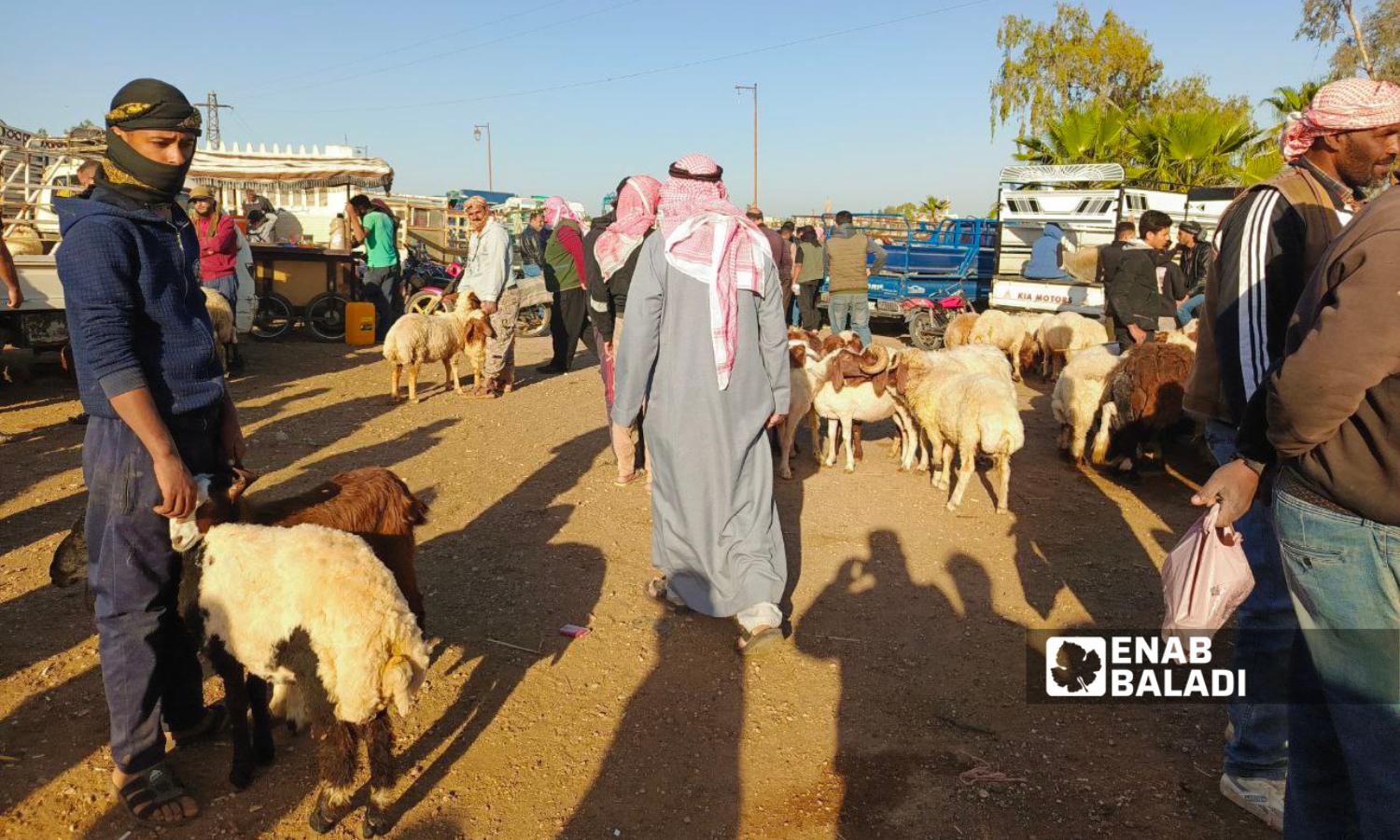Daraa – Mahjoub al-Hashish
The increase in feed prices in Daraa, southern Syria, has driven some breeders to sell part of their herds to compensate for their financial losses following the rise in breeding costs.
The most significant cost is the increase in straw prices, where the price per kilogram of wheat straw has reached 2,500 Syrian pounds, and chickpea straw has reached 3,500 Syrian pounds, while the price of straw has not exceeded 400 Syrian pounds per kilogram during 2024.
Drought has contributed to the decline in wheat, barley, and fodder crop production due to the failure of rain-fed crops and the inability of some farmers to irrigate their entire harvest.
No capacity for feeding
Hani Dahhi sold part of his flock of sheep in the village of Khirab al-Shahm in western Daraa, so he could buy feed for the remaining part.
Dahhi, who owns 500 sheep, stated that the price of straw has reached record levels that he cannot afford, in addition to the costs associated with storing enough straw for his animals for a whole year.
He added to Enab Baladi that the reasons for the rise in straw prices are due to a lack of rain, the failure of rain-fed agriculture, the reduced productivity of irrigated wheat, and the inability of most farmers to irrigate all their crops. He pointed out that while feed can be imported, straw is locally produced and the drought has affected all of Syria.
Riad al-Misawi, who works in livestock breeding and trading in Daraa, told Enab Baladi that the high price of straw represents the largest cost for breeders, as its price has multiplied by almost five times and is associated with the rising price of feeds currently linked to the exchange rate of the US dollar, which is equivalent to 9,100 Syrian pounds for one dollar.
Drought affected crops and pastures
The wave of drought last winter affected the productivity of wheat, barley, and legume and fodder crops.
Agricultural engineer Ahmad Kiwam stated to Enab Baladi that the drought wave affected the quality of wheat, barley, and fodder crops, leading to a decrease in production.
He added that rain-fed crops were sold as pastures for livestock and did not reach the harvesting season, which removed them from the production process. Additionally, some farmers were unable to irrigate all their wheat and barley crops in the irrigated lands, which also led to their sale as pastures for sheep.
He mentioned that some feeds were not produced in Daraa this season, such as al-Nu’manah, al-Kursunah, and al-Jilbanah, which are fodder crops sown rainfed at the end of winter and depend on soil moisture, which did not occur due to the reduced amount of rain.
Sheep breeder Abdullah al-Subuh in the town of Zeyzoun in western Daraa said that pastures used to last until the end of May in previous years, while this year they dried up early in March.
He added that he compensated for the pasture feed by purchasing crop residues, which have also risen in price, where the cost of renting a dunam of fava beans reached more than 600,000 Syrian pounds, a dunam of non-irrigated wheat 500,000 Syrian pounds, and a dunam of barley or wheat residues 500,000 Syrian pounds, whereas the cost of renting these was less than 100,000 Syrian pounds last year.
He noted that the health of his livestock has declined as he economized on feeding them straw and feed, adding that he has sold part of his livestock in successive phases and expects to sell larger quantities in the upcoming period.
According to the latest statistics from the Daraa Agricultural Directorate, the area cultivated with irrigated wheat this season reached 9,204 hectares out of the planned 10,000 hectares, achieving an implementation rate of 92%. It was also stated that the condition of the crop is between good and average.
Among the most affected crops by the drought in Daraa is olive, although its trees are more resistant to drought than others and can be watered twice during the summer, provided that the land is plowed regularly to maintain soil moisture, according to a report by Enab Baladi/Syria Indicator.
Significant losses for livestock breeders in Daraa Enab Baladi.
Hence then, the article about significant losses for livestock breeders in daraa was published today ( ) and is available on ُEnabbaladi ( Syria ) The editorial team at PressBee has edited and verified it, and it may have been modified, fully republished, or quoted. You can read and follow the updates of this news or article from its original source.
Read More Details
Finally We wish PressBee provided you with enough information of ( Significant losses for livestock breeders in Daraa )
Also on site :
- California Dreamin’: NBC Kicks Off 2028 L.A. Olympics Marketing Campaign With Kate Hudson (Exclusive)
- Zelensky tells BBC Putin has started WW3 and must be stopped
- Kate Hudson Delivers Powerhouse Performance of 1966 Hit in New Olympics Promo

